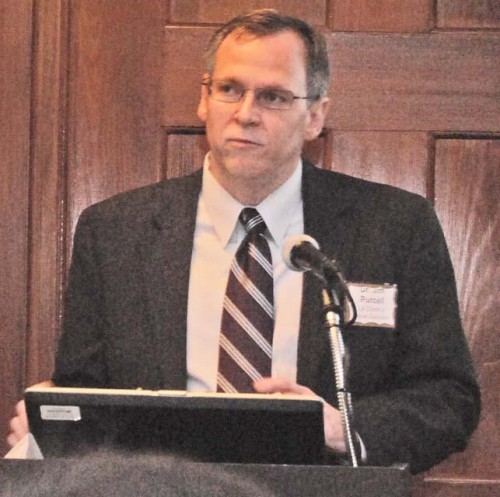Downtown Art Gallery 630 (Houma)
November 14, 2011
That’s one Happy Devil
November 15, 2011Less than a year into his new gig, Louisiana’s commissioner of higher education pleaded with the bayou region’s business leaders to develop a creative investment plan that would benefit the area’s postsecondary education and, in turn, the businesses themselves.
Jim Purcell cloaked his presentation to the Bayou Industrial Group last Monday with facts and media reports that show, on a macro level, the American Dream is a myth.
Investment is the key to revitalizing the state’s graduating workforce and motivating more K-12 students to seek higher learning, he said, and the commissioner put the onus on the business leaders, “There’s almost an expectation, if you can’t do it through Baton Rouge, it can’t be done,” Purcell said. “In a lot of other states, the community colleges, especially, are funded locally.”
Every high school graduate from Tulsa County, Okla., is offered a free education at Tulsa Community College, and local philanthropists buy freshmen books for their first year.
In Arkansas, an alumnus developed the $20 million El Dorado Promise, which ensures every graduate of El Dorado High School the opportunity to go to any accepting institution in the nation at no cost.
The students aren’t the only beneficiaries. Purcell said data shows higher civic involvement, a greater volume of home ownership, less criminal convictions and a better-trained workforce for local businesses to recruit.
“It instantly changed the graduation rate of that high school because everybody had a chance at the American dream,” Purcell said. “It instantly changed that community, property values went up 4 percent the first year because everybody wanted to be a part of that district.
“To me, these type of things can put your city on the map and move them forward.”
Earlier in the meeting, LA 1 Coalition Executive Director Henri Boulet said the Tiger III Grant Application to the federal government for the revamping of La. Highway 1 would include $6.6 million in local monies. Purcell, who has made this plea before, asked the leaders to use a similar approach with education.
“Right now, there is not local skin in the game in the state,” he said. “To me, if we can get some local people to invest in the local community, you can do it on your terms, on your time, and you can do it a lot quicker.
“I really need a local community, whether it’s through an investment through tax or philanthropy, to think about what we can do to make that local community pop and be successful.”
Terrebonne Parish President Michel Claudet said Purcell’s presentation gave the community something to strive toward, a collective effort at bolstering the area’s higher education system, but he added that he can’t foresee one individual from the area making a $20 million donation to the cause.
“Periodically, and I’ve always thought that down here one of the reasons that education wasn’t so keen was because of the fact they had the ability to work at the oil field at the drop of the hat,” Claudet said. But, as [BIG members] said, they may now require some type of certificate before they can go out, and that makes a gigantic difference in the workforce. If they want to get that kind of money, they’re going to have to get some education, and I think that’s going to be a good thing.”
Quoting numbers from Shadow Government Statistics Newsletter, Purcell said the nation’s peak unemployment rate of 9.7 percent was really closer to 22 percent.
“If we looked at another country and said 1 in 5 of their citizens were walking around not actively engaged, we would find that to be a problem and there would probably be a lot of effort to get that rectified,” he said. “We are that country now.”
Purcell said 39 percent of America’s middle class has a high school diploma or less. By 2018, 50 percent of the state’s jobs are going to require some form of post-secondary education, he added.
“If you want people to have access to the American Dream, they’re going to have to have access to a certificate of associate’s or bachelor’s credential to move forward,” Purcell said. “So we’ve become the gate keeper, and that’s important.”
Purcell lauded the Houma-Thibodaux’s unemployment rate, the lowest in the state and among the best nationwide. “Y’all are the workforce role model for this state,” Purcell said. “That’s amazing, and that’s what we’re trying to replicate in the rest of the state.”
Purcell, an Alabama native, is Louisiana’s 7th commissioner of higher education. Before his appointment in February of this year, Purcell served more than two years as the director of the Arkansas Department of Higher Education.
Officially, Purcell supervises the Board of Regents’ staff and represents the state’s post-secondary education community at the state and federal level.
He will also administer provisions in the Grad Acts, two keystone pieces of higher education legislation passed since 2010 that provide universities flexibility in business for meeting data benchmarks.
“We asked our universities to double their degree production by 2025,” Purcell said. “Not only the volume of people, but increased graduation rates.”
The state is working toward a first-time enrollment ratio of 60 to 40 percent between and two- and four-year institutions, Purcell said.
Louisiana’s Commissioner of Higher Education Jim Purcell revealed his plan to help the next generation live at a middle-class level by investing and donating toward programs that could bolster enrollment rates and high school graduation rates. ERIC BESSON










